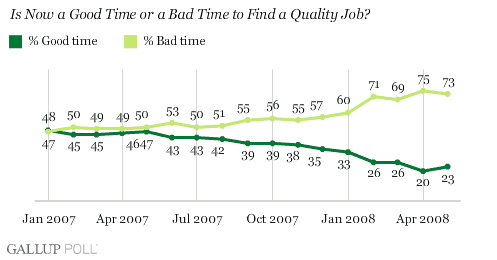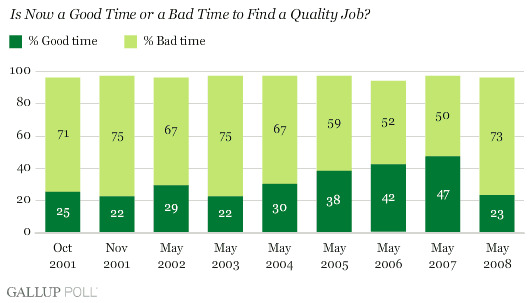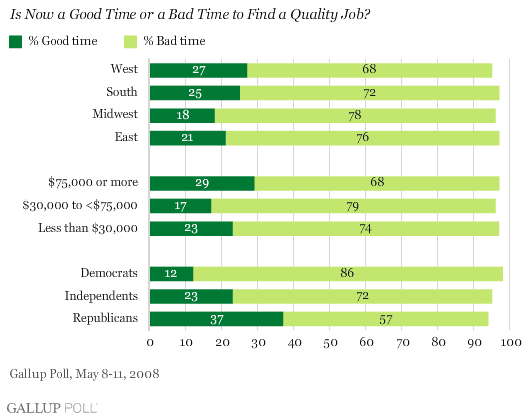PRINCETON, NJ -- Seventy-three percent of Americans say now is a "bad time" to find a quality job -- slightly better than the 75% who felt this way in April, which was the highest level since September 2003.

Job-Market Conditions Are Not Good
Over the first four months of this year, the U.S. economy lost more than a quarter of a million jobs. But the April jobs decline totaled only 20,000 -- smaller than was generally expected. In turn, some observers have interpreted this to suggest that while the labor market is weak, it is not as weak as in other economic downturns.
However, the reality is that Americans' perceptions of the job market are currently just about as bad as they've been at this time of year since Gallup began monitoring the issue in late 2001. Today's 73% of Americans rating now as a bad time to find a quality job far exceeds the 50% and 52% who felt this way in May 2007 and May 2006, respectively. In fact, it reflects the highest level of pessimism about the job market during this time of year since May 2003, when 75% held a similar opinion after the beginning of the war in Iraq. Sixty-seven percent felt it was a bad time to find a quality job in May 2002, while just after Sept. 11, 71% felt this way in October and 75% in November 2001.

Republicans Much Less Pessimistic Than Democrats
Given the decline in manufacturing activity as reflected by the larger-than-expected 0.7% drop in U.S. industrial production, it is not surprising that job-market perceptions are worse in the Midwest (78%) and the East (76%) than in the South (72%) and the West (68%). Similarly, more lower-income (74%) and middle-income (79%) Americans rate this as a bad time to find a quality job than do those with higher incomes (68%).
However, the largest differences in job-market perceptions appear by political affiliation. Republicans are least pessimistic about current labor-market conditions, with 57% saying it is a bad time to find a quality job. A much-higher 86% of Democrats feel this way, along with 72% of independents.

Commentary
While most Americans have concluded that the U.S. economy is already experiencing a recession, economists continue to debate the issue. Those who do not believe the United States is in a recession point to, among other things, the job market. For example, they see that initial jobless claims rose last week to 371,000, while the four-week moving average fell by 1,000 to 365,750, and they say job losses simply aren't at recessionary levels.
On the other side of the argument are those who suggest that today's job losses are different from past losses. Many companies appear to have entered this economic slowdown operating with much leaner staffing levels than in the past. In part, this may be because of increased globalization and job outsourcing that have allowed firms to grow while adding fewer employees. In turn, this seems to have made it easier for many companies to reduce their staffing through normal attrition as opposed to layoffs.
Whatever the reasons, Gallup's measurement of Americans' job-market perceptions tends to support the idea that current labor-market conditions are just about as bad as they've been at any time this decade. The only possible exception would be in 2003, before and after the beginning of the Iraq war, when the percentage of Americans saying it was a bad time to find a quality job actually hit 81% on two occasions. But even in May of that year, 75% of Americans held the view that it was not a good time to find a quality job.
At this point, the sharp disagreement in job-market perceptions among Republicans as opposed to Democrats is likely to make jobs an election-year issue. Whether federal rebate checks will improve current job-market conditions and ameliorate the issue, even temporarily, is yet to be seen. On the other hand, if the job situation continues to deteriorate, jobs are likely to become a much bigger election-year issue. Then, economists who currently doubt whether a recession is underway may find they agree with the majority of Americans who think the only real issue is how severe the current recession will be.
Survey Methods
Results are based on telephone interviews with 1,017 national adults, aged 18 and older, conducted May 8-11, 2008. For results based on the total sample of national adults, one can say with 95% confidence that the maximum margin of sampling error is ±3 percentage points.
Interviews are conducted with respondents on land-line telephones (for respondents with a land-line telephone) and cellular phones (for respondents who are cell-phone only).
In addition to sampling error, question wording and practical difficulties in conducting surveys can introduce error or bias into the findings of public opinion polls.
To provide feedback or suggestions about how to improve Gallup.com, please e-mail feedback@gallup.com.
